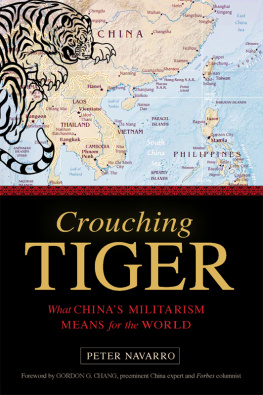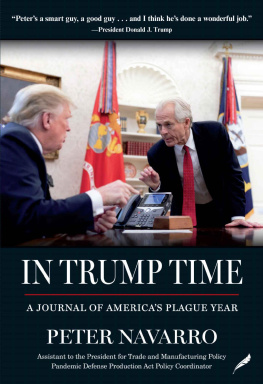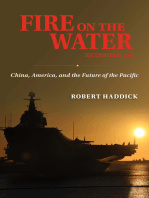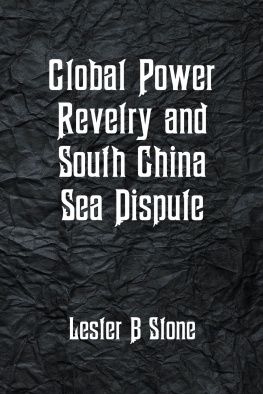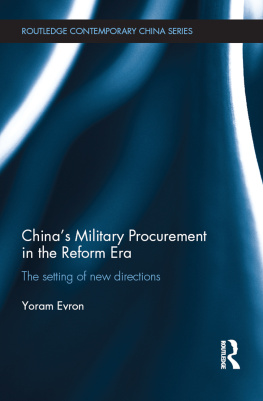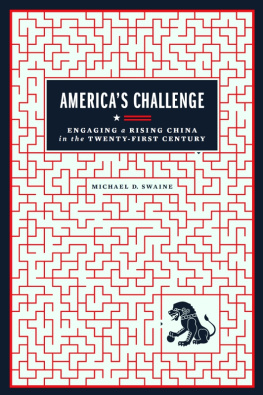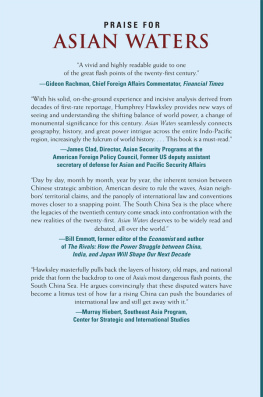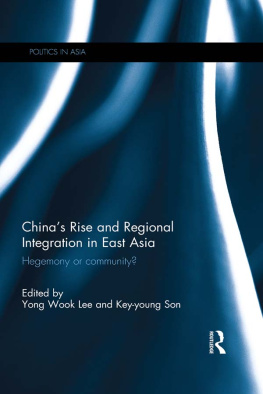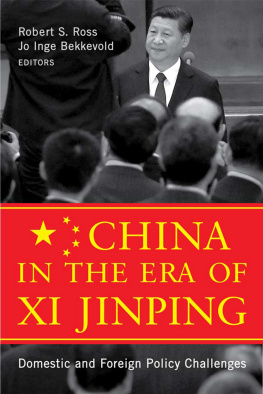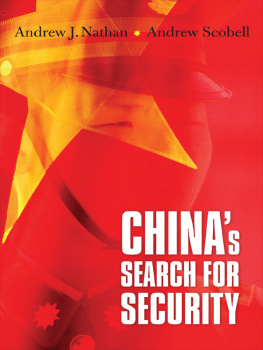
Much of the source material for this book is derived from what is a very extensive English and Chinese literaturescholarly, journalistic, and government-sourced. However, the detective story you are about to begin could not have been crafted without the help of a large number of experts who graciously agreed to sit down in front of a camera for in-depth interviews with the author. These experts, all of whom appear in the companion documentary film series to this book, include:
- Michael Auslin and Dan Blumenthal, American Enterprise Institute
- Professor Greg Autry, University of Southern California
- Richard Bush and Michael O'Hanlon, Brookings Institution
- Gordon G. Chang, author, The Coming Collapse of China
- Kurt Campbell, former US Assistant Secretary of State
- Dean Cheng, Heritage Foundation
- Bernard Cole and T. X. Hammes, National Defense University
- Patrick Cronin, Center for a New American Security
- Seth Cropsey, Hudson Institute
- Richard Fisher and Ed Timperlake, International Assessment and Strategy Center
- Professor Aaron Friedberg, Princeton University
- Professors Amitai Etzioni and Charles Glaser, George Washington University
- Bill Gertz, senior editor, Free Beacon
- Bonnie Glaser and Michael Green, Center for Strategic and International Studies
- Professors Lyle Goldstein, James Holmes, and Toshi Yoshihara, US Naval War College
- Professor Stefan Halper, University of Cambridge
- Dr. Phillip Karber, president, Potomac Foundation
- Stephanie Kleine-Ahlbrandt, US Institute of Peace
- Professor David Lampton, Johns Hopkins University
- Professor John Mearsheimer, University of Chicago
- Commissioners Pat Mulloy, Dan Slane, and Michael Wessel, US-China Economic and Security Review Commission
- Michael Pillsbury, author, The Hundred-Year Marathon
- Sheila Smith, Council on Foreign Relations
- Mark Stokes, executive director, Project 49 Institute
- Ashley Tellis, Carnegie Endowment for International Peace
I wish to deeply thank each of these individuals for their generous gift of time, their incredible patience with me and my film crew, and most of all, for bringing a diversity, richness, and balance to the investigation with their keen expertise and often markedly contrasting points of view. Excerpts from these interviews may be accessed from this book's official website: www.crouchingtiger.net.

Question: Based on the historical record, how likely is war between a rising power like China and an established superpower like the United States?
- Very likely
- Very unlikely
Will a rapidly rising China play the upstart Athens to America's wary Sparta as both plunge headlong into the infamous Thucydides Trap?
Like America of today, Sparta in the fifth century BCE was the reigning superpower and hegemon when Athens came bursting onto the scene and quickly emerged as the preeminent civilization of its time. As Harvard University scholar Graham Allison has observed:
This dramatic rise shocked Sparta [and] fear compelled its leaders to respond. Threat and counter-threat produced competition, then confrontation and finally conflict. At the end of 30 years of war, both states had been destroyed.
Fast-forward to the nineteenth century, and we see another classic case of two great powers falling into the Thucydides Trap. That's when Kaiser Wilhelm's Imperial Germany emerged to challenge the hegemony of a British Empire that had ruled the wavesand thereby the worldfor more than a century. Ominously, the grim result of this particular clash between a rising power and an established power was the slaughter of millions of soldiers and civilians in the first true world war.
Of course, two anecdotes hardly prove a theory. That's why this particular statistic is particularly alarming: Across the broad swath of world history, in fully eleven of the fifteen times since 1500 that a rising power like China faced an established power like the United States, war resulted more than 70 percent of the time. On that basis alone, no sensible speculator would want to put big money on China's peaceful rise over the next several decades.
As to exactly why Athens versus Sparta and Germany versus Great Britain and a host of other rising versus established power pairings seem to inevitably plunge into war, University of Chicago professor John Mearsheimer has produced arguably the most convincing theory of what he calls the tragedy of great-power politics.
Mearsheimer's theory rests on three key assumptions. The first is that the global system is anarchic rather than hierarchicalmeaning there is no higher authority than nations. The important implication of this no night watchman assumption is that if a nation gets into trouble, it can't dial 9-1-1 for help. Therefore, it must take steps to protect itself by building military capabilities.
That all nations build up such military capabilitiesthe weapons of waris the second key assumption of Mearsheimer's theory. However, while one nation can easily determine the capabilities of a rival nation by counting its airplanes, guns, ships, and other weapons, it is far more difficult to know its rival's intentions. Is that rival country developing military capabilities simply to defend itself or, alternatively, does it have conquest in mind?
That, in fact, is the third key assumption of Mearsheimer's theory; namely, it is difficult or impossible to know a nation's true intentions. It is precisely this opaqueness of a country's intentions coupled with the lack of a night watchman to call upon if one is in trouble that leads to the same kind of fear that Sparta began to have of Athens, Europe had of both Kaiser Wilhelm's imperium and Adolph Hitler's Third Reich, and many nations in Asia, along with the United States, are now experiencing when it comes to a rising authoritarian China.
Not surprisingly, such existential fear, in turn, leads nations to increase their own capabilities so as to be able to defend themselves against a rising nation. The result is a vicious escalatory spiral captured in yet another famous construct of international relations theorythe so-called security dilemma. The typical trajectory of the security dilemma is an arms race that inexorably ratchets up until an actual shooting war erupts, often as a result of some miscalculation or random event, for example, the assassination of Archduke Franz Ferdinand in Sarajevo that triggered World War I.
The final piece of Mearsheimer's tragedy of great-power politics that seems most applicable to the case of a rising China is the inference that, as a matter of survival, all big countries will seek to be the preponderant global power or hegemon. Explains Mearsheimer:
The key to understanding how China and the United States are likely to behave is to understand that in an anarchic world, there is a very powerful incentive to become as powerful a state as possible. And the reason is you can never be certain that another state won't grow to be powerful and have malign intentions towards you. So if you end up one day next door to a very powerful, hostile statepicture yourself living next door to Imperial Germany or Nazi Germany or Imperial Japanyou want to make sure you're much more powerful because if that state decides it's going to play rough, there's no higher authority to pull your chestnuts out of the fire. So the best way to be secure in an anarchic system is to be a regional hegemon, to dominate your area of the world to the point where nobody can cause you any trouble.

